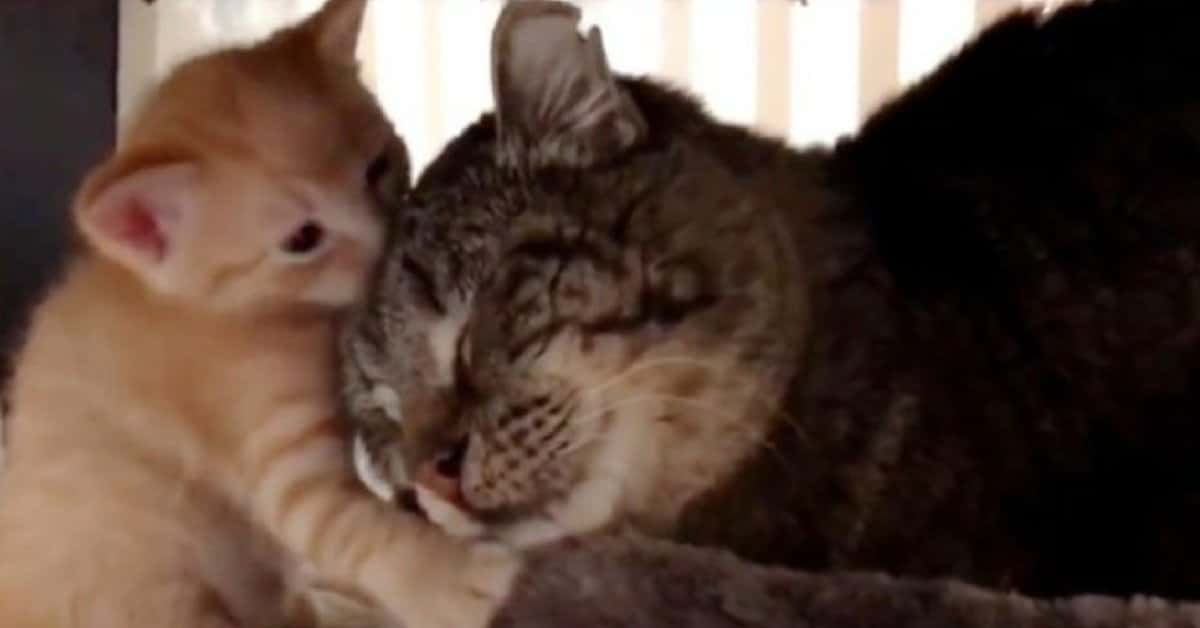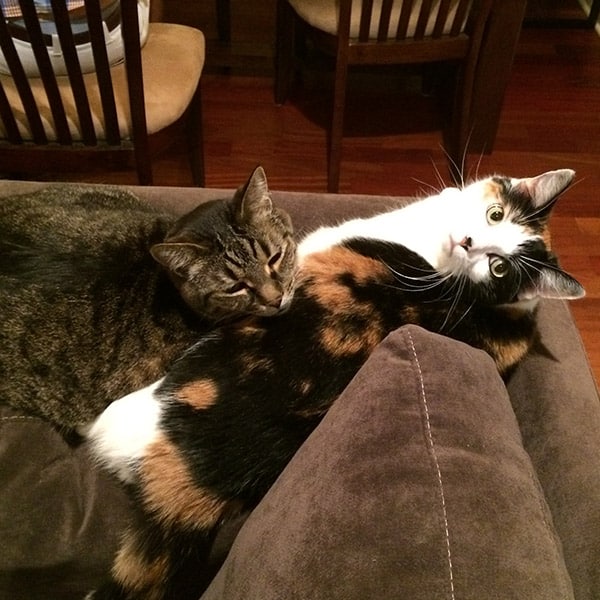Signs Your Cat Is Dying And When To Euthanize
There is nothing more challenging than watching your feline friend reach their end.
Our cats can begin to decline in health as they enter their senior years, making it so important for us to know when its time to say goodbye.
So what are the signs of a dying cat?
In this article we will get into the details of complications in elderly cats, and help you understand when it may be time to say goodbye to your feline friend.
What Changes Should I Look For In Breathing
Breathing difficulty such as shallow breathing, mouth breathing, or panting may indicate a problem with the airways or lungs. Cats with breathing problems often will have their head and neck extended or may be unable to sleep in a normal position. Repeated bouts of sneezing or coughing are signs of health issues.
What Changes Would I See In Overall Appearance
Cats that are not feeling well may just look a little off. The cat might sit in a hunched position, might not move as gracefully as before, might not lift its head properly, might have a head tilt, or might carry its tail in a different way than normal. Sometimes there is not any one thing that stands out, but instead a variety of subtle changes.
Dehydration is a common problem in cats that are not well. To see if your cat is dehydrated, gently grasp her skin near her shoulder blades, pull it up and away from her body, then let go. The skin should snap back into place right away skin that does not snap back into place, but stays tented up usually indicates dehydration, a condition that needs to be treated right away.
Cats that have some sort of chronic illness may develop slow and subtle weight loss that is only obvious when you actually run your hands along the ribs and spine. Cats that suddenly lose weight, particularly if they were previously overweight, are usually suffering from some sort of metabolic disease such as diabetes or hyperthyroidism.
Read Also: My Cat Keeps Throwing Up White Foam
Your Normally Hungry Moggy Cant Face Dinner
Some cats will happily skip a meal if they hunt for themselves or simply because they fed well previously. If they miss two or three meals in a row, this may be a sign of an underlying medical problem.This does not have to mean they are in immediate danger, however. Though it is definitely worth consulting your vet! Parasites and other medical issues can also lead to your cat not wanting anything to do with their food. However, a lack of appetite in cats is not a good sign, especially if your pet is old or sick.
How We Can Help

Sometimes it helps to share your feelings with someone who knows from personal experience how distressing the loss of a cat can be, and who will listen with compassion and without judgement.
Our Pet Bereavement Support Service offers support to grieving pet owners, through a national network of trained volunteers. We’re here seven days a week via phone, email and webchat.
Telephone:
We also have a if you’d like to join a community of people supporting each other through their grief.
You May Like: How Long Will A Cat Hide If Scared
When To Say Goodbye To Your Dying Cat
So how do you know when its time to say goodbye to your dying cat?
Choosing to let your furry friend go is one of the hardest decisions in pet ownership, especially when you are unaware of the signs to look for.
To help you make the most informed decision for your cat, we will get into the signs of when you know its time to say goodbye.
- No longer eating
- Chronic vomiting or diarrhea that wont resolve
- Extremely weak or always sleeping
- No longer getting up to use the litterbox
- Extreme weight loss
- Dehydration
- No longer responding to supplementary veterinary care
If your cat is experiencing any of the above symptoms, it may be their way of telling you they are ready to let go.
Euthanizing your cat can be the kindest thing you can do for them at this point, as they may only continue to suffer as the time passes.
If you are ever unsure of what is best for your feline friend, your veterinarian can offer the guidance you need.
Saying goodbye to our feline companions is hard, but it can be the purest form of love when they begin to suffer.
Be sure to review the information we discussed above on the signs of a dying cat, and you can better understand your senior cat going forward.
When Is The Right Time To Euthanize A Pet
None of us has a crystal ball, and our cats cant tell us when theyve had enough. We have to make the best decision we can, and it can be helpful to have an outsiders perspective. Reaching the decision to euthanize a beloved pet is one of the hardest decisions you will ever have to make. However, euthanizing your cat and not making them suffer until death is the greatest kindness you can give them as well.
Dr. Mary Gardener, founder of Lap of Love, an in-home pet euthanasia practice, identifies four types of budgets that families should consider.
- Financial budget: End-of-life veterinary care often be expensive and put a strain on the household budget.
- Time budget: A terminal pet often requires intensive home care, which can take up a considerable amount of time. If you work full-time out of the house or travel a lot, this can impact your ability to provide optimal care.
- Physical budget: Are you physically able to care for a terminal cat? Are you capable of lifting them out of the litter tray if they are unable to walk, managing accidents, or taking the cat for vet check-ups?
- Emotional budget: Caring for a terminal cat carries a huge emotional toll. For me, caring for my beloved cat for over 6 months during her cancer treatment was emotionally hard. Some of our pets are a link or a bridge to the past. They might represent our childhood, a marriage, a difficult period in our lives, or a family member who is no longer with usall of which can make it even harder to let go.
Also Check: Never Miss Cat Litter Box
Most Common Signs & Symptoms Of A Cat Dying
1. Typical of indoor cats: the common downhill trajectory.
MOST of the time , they will gradually become less energetic skinnier their fur will gradually lose its sheen and become scraggly in appearance AND THE CATS APPETITE WILL BEGIN TO INCREASINGLY WANE. The cat may even become too weak or disinterested to make it to its litter box and may increasingly void on your carpets or bed. At this stage, the owner will usually take it to a vet for proper diagnosis . This can usually be treated for a short time with a change of diet and medication until, ultimately and sadly, one must eventually bring it back to the vet to have him/her euthanized.
2. Typical of outdoor cats: the dying cat disappearing.
When a cat is ill, or if it thinks its dying, it will disappear. This seems to be an evolutionary hold-over from when cats lived in the wild. Apparently, they would disappear so as not to become easy prey to predators. For the same reason, cats cover their feces when finished . Theyre covering their scent from potential predators.
3. Typical of both indoor and outdoor cats: looking for a solitary place to die alone.
Often, when cats know theyre dying, they will stop eating or drinking, and they will find a place to go die alone.
4. Alternatively: Typical of all cats, saying goodbye and wanting company before death.
5. One thing seems to be certain: cats seem to sense when they are dying.
Choosing Euthanasia For A Dying Cat
If your cat is exhibiting signs of being near death, you may want to consider talking to your vet about euthanasia. This can be the more humane choice in cases where there is significant pain and suffering involved.
If you choose to put your pet to sleep, your vet will give him an injection that will slow his heart to a stop. This takes only seconds and is not a painful procedure. You will usually be given the opportunity to stay with your cat throughout the process if you wish. Euthanasia can put an end to a pet’s suffering as well as shorten the emotional distress you feel. Some areas may even offer a house-call euthanasia service.
Read Also: Get Cat Neutered For Free
Common Illness In Elderly Cats
As our cats reach their senior years, they may begin to experience illness and overall decline in their health.
While some cats simply deteriorate in health due to old age, others struggle with chronic illness.
To help you understand the possible ailments that your senior cat may experience, lets discuss some of the most common health conditions in elderly cats.
What Are The Signs Of Mourning
When a cat loses a companion, whether animal or human, she most certainly grieves and reacts to the changes in her life. Cats alter their behavior when they mourn much like people do:
- They may become depressed and listless.
- They may have a decreased appetite and decline to play.
- They may sleep more than usual and move more slowly, sulking around.
- They may hide under the bed, choosing to be alone even more than usual for cats.
Pet owners recognize these changes in daily behavior as the same ones that grieving humans often exhibit. The common denominator in human or feline grief is the loss of a central individual along with the associated bond.
Skeptics suggest that cats dont really grieve and attribute their behavioral changes to the alterations in daily routine resulting from the absence of an integral figure in the cats life. In other words, the cat gets upset because her schedule is off. With the loss of a companion cat, perhaps the surviving cat misses feline interaction and play time. With the loss of a human companion, perhaps the established and accepted feeding and play schedules are changed as the new care giver takes charge. Since they may not actually understand death as something permanent, sometimes a cat will wait patiently, believing that the deceased will return. Still others suggest that the cat may just be reacting to the grief exhibited by humans in the house as they deal with the death of a family member.
You May Like: Dr Elsey’s Precious Cat Long Hair Litter
Saying Goodbye Is Never Easy
Watching your cat die can be upsetting and disheartening. By understanding and coming to terms with the dying process, you can make decisions based on what is best for your pet rather than your emotions. It’s natural to feel a profound sense of loss after your cat’s death, so be sure to give yourself plenty of time to grieve. Someday the grief will ease, and you may decide it’s time to bring a new cat into your life.
Pet Loss During Covid

During coronavirus, many pet owners had to make the heart-breaking decision to put their pet to sleep without being there with them at the end. Social distancing and government restrictions made it impossible for vets to allow owners into the clinic.
Though this will be hard to process, remember that there is nothing you could do about this. Coronavirus took a lot of moments away from many people try to be kind to yourself and know that you did the best you could for your pet in a very hard situation.
Recommended Reading: Emotional Support Certificate For Cat
Cat Has Lack Of Energy
When our cats are nearing the end of their life, they will often experience a lack of energy.
They may not be as willing to do things they once loved, and you may find them sleeping the days away.
If its becoming harder and harder to get your cat up and moving each day, you may need to discuss your cats quality of life with your veterinarian.
What Changes In Sociability Or Energy Level Would Indicate That My Cat Might Be Sick
Sick cats usually become withdrawn and may hide, although this does depend on the personality of the individual cat. Some cats become more clingy or demanding of attention, while others just become cranky.
As a general rule, cats that are sick will have lower energy levels. The only thing you may notice is that your cat sleeps more, does not play as much, or is restless. With some diseases, especially hyperthyroidism, your cats energy level may actually seem to increase to the point of hyperactivity. Cats with hyperthyroidism often are restless at night and may suddenly begin howling or waking family members up.
“As a general rule, cats that are sick will have lower energy levels.”
Cats with arthritis or other joint problems may have difficulty moving around and may no longer jump up on furniture or counters, or may change the way they jump onto higher surfaces. If your cat suddenly is unable to use its back legs, she should be seen by your veterinarian immediately.
Read Also: A Kitten Sits In A Lightweight Basket
How Can I Help My Cat Cope With Grief
When signs of grief become evident following the loss of an animal or human family member, concerned owners can help their cats deal with grief in the following ways:
| Contributors: Lynn Buzhardt, DVM |
Keep Your Cats Space Calm And Quiet
Try to keep your home calm and quiet, so your cat can rest peacefully. Minimize unfamiliar visitors if you can, and see if you can keep the commotion in your home to a minimum. If you have family gatherings or activities planned, try to have them take place outdoors or in other rooms.
You may also want to play quiet calming music or sounds to provide extra comfort and block out other noise classical music, birds chirping or the sound of rainfall can help relax and soothe your cat.
You May Like: Will Female Cats Stop Spraying After Being Spayed
What Changes Should I Look For In The Litterbox
Both diarrhea and constipation are indicators of disease in cats. Diarrhea is usually easy to recognize in the litterbox, but constipation can be more problematic to notice. Small, hard, dry stools are never normal and are often an early indication of kidney disease.
Increased amounts of urine in the box indicate an of inability to properly conserve water and may mean that your cat is developing kidney or liver problems, or diabetes mellitus.
Low Heart Rate And Respiration
Likewise, your cats heart rate and respiration may slow as its body begins to shut down. The resting heart rate for a healthy cat ranges from about 150 to 200 beats per minute, and a healthy cat takes about 20 to 30 breaths per minute. If you check your lethargic cats heart rate and find it sluggish, and if you notice your cat taking fewer breaths than usual, these are likely warning signs.
You May Like: How To Get A Sick Cat To Eat
Make A Clean Comfortable Bed Available
To make your cat feel more comfortable, add special touches to their cat bed or whatever place your cat likes to sleep. Add extra blankets for cushioning, and be sure to change the blankets regularly if your cat is having trouble getting to the litter box.
You can also line the bottom of the bed with a small heating pad or electric blanket to help keep your cat warm and toasty. Youll probably want to add extra blankets on top to keep the heating pad from making your cat too hot.
Cat Has Vomiting Or Diarrhea

Sometimes a dying cat will experience serious gastrointestinal issues near the end of their life.
Whether its due to a chronic medical condition or not, these symptoms can cause a serious drop in their overall health.
If your cat is experiencing chronic vomiting or diarrhea in their old age, it may be time to let them go.
Don’t Miss: Kittens For Sale Columbus Ohio
Can I Let My Cat Die At Home
If your cat is pain-free and peaceful then allowing them to die at home may be the best option. Unfortunately, many cats reach a point where pain and illness are making their days miserable. A vet will be able to help you ascertain how much quality of life your senior cat has in those final weeks and months.